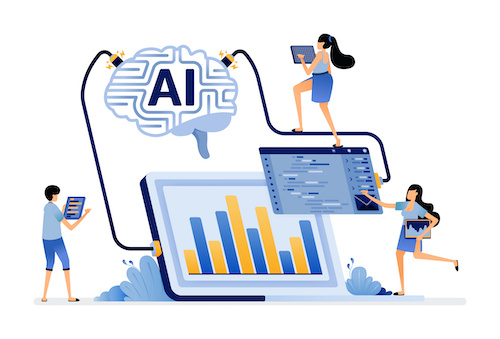Click Here for Everything You Need To Know About AI In Education
Editor’s note: This story on how to manage academic integrity as generative AI moves into classrooms originally appeared on CoSN’s blog and is reposted here with permission.
With AI dominating conversations among education leaders, the importance of managing expectations and academic integrity is now more critical than ever as the new school year commences. Most districts are realizing that straightforward banning of ChatGPT and other tools only keeps the students without home access and data plans from using A toolsets. Certainly, none of us want to create additional digital inequities. However, as students leverage generative AI for assignments and “Cheat detectors” prove ineffective in detecting AI-generated output, school administrators must take proactive measures to safeguard the authenticity of student assignments and promote ethical use.
Since AI-detection tools are being shown to fall short in detecting AI-generated output, it becomes crucial for school administrators to be proactive to ensure ethical use and safeguard the authenticity of student assignments. The best way to manage assignments and ethical use is to set expectations and put them front and center in the assignments themselves. Teachers need training on how to rework assignments to incorporate and evaluate the AI generated output. Academic Integrity Statements are a good place to start with districts setting expectations for students. Academic Integrity Statements allow educators to put ethics first and teach essential tenets to students up front. They should be integrated into the framework of every project and report while emphasizing the importance of honest work and original thinking. By encouraging students to pledge their commitment to academic integrity, we instill in them a sense of responsibility and respect for the academic process. Can students just give this lip service? Yes, of course, But that does not reduce their importance. We also have a board approved RUPs (AUPs) that set expectations on tech use that may get circumvented. They set the standard, much like a speed limit sign does on a city street. As educational leaders, we must emphasize the significance of academic integrity, not just as a set of rules but as a core value that fosters a positive learning environment. By making it a focal point, we reinforce the notion that authentic learning experiences and personal growth come from genuine effort and creativity.
This may beg the question of the need for school board policies around Generative AI. Although this may initially seem like a good idea, The rapid pace of change in AI and the slow change of policy may indicate otherwise. I think that it may be better to couch AI management under administrative guidelines and let them fall under the RUP (AUP) or other existing policies. We found this to be true in our district as well with Social Media several years ago and issued Guidelines under our RUP.
The concerns surrounding Generative AI’s impact on academic integrity, among larger issues, have not gone unnoticed in the tech industry. Prominent voices, including Sam Altman of OpenAI, have urged AI regulation to ensure ethical and responsible use. As educational leaders, we must lead the call for action to protect the integrity of our academic institutions.
With at least 15 states already considering bills related to Generative AI and its potential impact on various industries, it’s not far-fetched to envision education as the next area of focus. As pioneers in the educational sector, we should proactively engage with policymakers and advocate for responsible AI usage that aligns with our values of integrity, fairness, and inclusivity. As we anticipate the evolving landscape of AI in education, it’s crucial to equip our schools and educators with the necessary knowledge and resources. Professional development programs should include training on identifying AI-generated content, how to adjust assignments to encourage prompt development/ evaluation, and best practices for fostering academic integrity.
As we embrace the digital age with Generative AI, promoting and managing academic integrity is a shared responsibility among our educational communities. We are taking steps like these to help ensure that our schools remain beacons of authentic learning in the digital age.
- The importance of the ITS and Facilities relationship - March 22, 2024
- How edtech is transforming bilingual education in the U.S. - March 21, 2024
- 5 ways to keep schools safer with innovative visitor management - March 21, 2024


